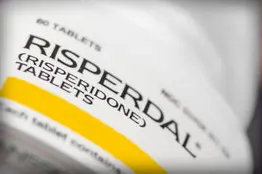J&J Faces Fines Drug Case~4 min read
 Arkansas is added to the growing list of states penalizing Johnson & Johnson based on allegations of misrepresentation of effectiveness and/or potential dangers of usage of pharmaceutical designed for the treatment of psychosis, schizophrenia and bipolar disorder. Read about this in the article by Katie Thomas of The New York Times.
Arkansas is added to the growing list of states penalizing Johnson & Johnson based on allegations of misrepresentation of effectiveness and/or potential dangers of usage of pharmaceutical designed for the treatment of psychosis, schizophrenia and bipolar disorder. Read about this in the article by Katie Thomas of The New York Times.
A judge in Arkansas ordered Johnson & Johnson and a subsidiary to pay more than $1.2 billion in fines on Wednesday, a day after a jury found that the companies had minimized or concealed the dangers associated with an antipsychotic drug.
Risperdal is approved to treat schizophrenia, bipolar disorder and behavior problems.
The fine, which experts said ranked among the largest on record for a state fraud case involving a drug company, is the most recent in a string of legal losses for Johnson & Johnson related to its marketing of the drug, Risperdal.
In January, Texas settled a similar case with the subsidiary, Janssen Pharmaceuticals, for $158 million. Last year, a South Carolina judge levied civil penalties of $327 million against Janssen, and in 2010, a Louisiana jury awarded nearly $258 million in damages.
The Arkansas Circuit Court judge, Tim Fox, issued a penalty of $1.19 billion for nearly 240,000 violations of the state’s Medicaid fraud law; he also fined the companies $11 million for violations of the state’s deceptive practices act.
The state’s attorney general, Dustin McDaniel, called the judge’s decision a “big win” for Arkansas. “These two companies put profits before people, and they are rightfully being held responsible for their actions,” he said in a statement.
The size of the fine calls into question the status of pending lawsuits filed by several state attorneys general against the companies, said Patrick Burns, a spokesman for Taxpayers Against Fraud, an advocacy group for whistle-blowers.
Given the decision in Arkansas, “the game has fundamentally changed,” he said. “Most attorneys general can do the math, and there’s no reason for any state to settle if they can win really big numbers in court.”
Mr. Burns said a proposed civil settlement between the companies and the Justice Department may also be called into question given the Arkansas case. Johnson & Johnson said in company filings that it has reached an agreement in principle with the federal government to settle a misdemeanor criminal charge related to marketing of Risperdal, but news reports have said that the Justice Department has rejected a proposed $1 billion settlement for the civil portion of the settlement and is seeking more money.
In a statement, Janssen said it would ask for a new trial or, if that failed, it would appeal. “The state did not show any Arkansas patient was ever harmed by using Risperdal,” the company said in its statement.
Prosecutors have accused Johnson & Johnson and Janssen of hiding the risks associated with Risperdal, which is approved to treat schizophrenia, bipolar disorder and behavior problems in teenagers and children with autism. Side effects can include weight gain, an increased risk of diabetes and, in older patients, an increased risk of stroke.
“They were trumpeting it as a miracle, breakthrough drug,” said Thomas Melsheimer, a lawyer who represented the whistle-blower in the Texas Risperdal case. Instead, he said, it was no better than cheaper generic alternatives. “It was grossly overpriced in relation to its qualities.”
Janssen has said it complied with all state laws and did not mislead doctors or patients about the risks of the drug.
In its 2011 annual report, Johnson & Johnson said it set aside money to pay for legal settlements or verdicts and did not expect the ultimate resolution of any Risperdal cases to affect the company in a material way.
The fine in Arkansas barely registered on Wall Street, where the company’s shares closed at $64.13, down 7 cents. At least one analyst speculated that the large fine would be reduced on appeal. Johnson has appealed the South Carolina and Louisiana decisions.
Johnson’s history with Risperdal is just one of several examples of government investigations into the marketing practices of pharmaceutical companies. In November, the British drug company GlaxoSmithKline announced that it had agreed to pay $3 billion to settle federal investigations into its sales practices for several drugs, including the diabetes drug Avandia.
In 2009, Pfizer settled for $2.3 billion over marketing of its painkiller Bextra. That same year, Eli Lilly pleaded guilty to criminal conduct involving its marketing of the antipsychotic drug Zyprexa and agreed to pay $1.4 billion in fines.
“Investors at this point have become inured to these large settlements,” said Les Funtleyder, a portfolio manager at Miller Tabak & Company, which owns Johnson & Johnson stock. “And you’ve seen it almost across all of pharma.”
If Wall Street is not moved, the public is increasingly fed up, as evidenced by the recent jury verdicts, said Erika A. Kelton, a lawyer in Washington who represented a whistle-blower in the Pfizer case involving Bextra. “I think it’s part of a bigger picture of a growing intolerance of pharmaceutical companies ignoring the rules of the road.”








